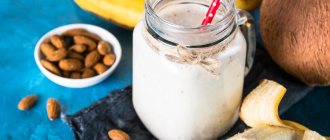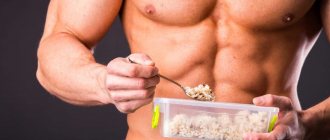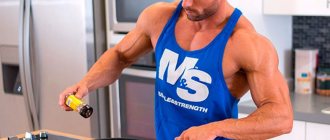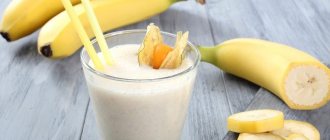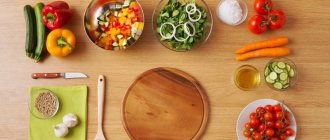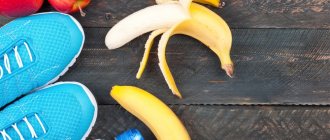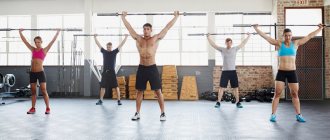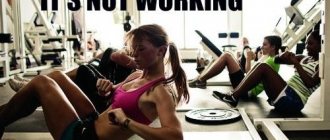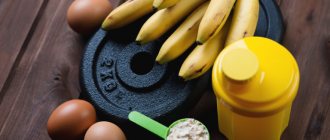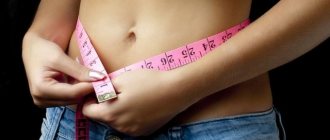Surely you have spotted people in the gym who, after training, drink protein shakes , eat bananas, and some even carry with them a container of buckwheat, for example, and boiled chicken. From the outside it looks quite wild, but people who strictly monitor the quality of their body, concerned about muscle growth and the fat burning process, do this because they know about the existence of the so-called protein-carbohydrate window.
Before you figure out what this window is, you need to define two concepts - anabolism and catabolism.
Protein-carbohydrate window[edit | edit code]
This article is an adapted translation of the 2013 scientific review “Nutrient timing revisited: there is a post-exercise anabolic window” from the Journal of the International Society of Sports Nutrition. By Alan Albert Aragon and Brad Jon Schoenfeld.
Protein-carbohydrate or anabolic window
is a hypothetical metabolic state in which the body is in dire need of nutrients (primarily protein[1] and carbohydrates) that, when consumed at specific times, lead to maximum anabolic response and muscle growth,[2] and just as importantly, it does not lead to the formation of fat mass.[3] In English, the term “Nutrient timing” is often used, or the strategy of eating around training time. Typically before and after training.
Many authors claim that this approach is the most productive for creating a beautiful body. It is also postulated that nutrition during the protein-carbohydrate window plays a more important role than all other food consumed during the day.
Theoretically, taking a certain ratio of proteins and carbohydrates leads to the initiation of restoration processes in muscle fibers damaged during physical training, as well as the replenishment of energy reserves, and this occurs according to the principle of supercompensation, leading to an improvement in body composition (the ratio of fat and dry mass), as well as increasing sports (strength) performance. Some researchers use the term “window of opportunity,” which describes a limited period of time after training that provides the opportunity for rapid recovery and growth with proper nutrition. Many authors emphasize that the significance and even the presence of the protein-carbohydrate window can vary significantly depending on a number of factors.
However, the significance and, most importantly, the reliability of these judgments have not yet been tested. Moreover, recent scientific evidence has called into question the classical concepts of the protein-carbohydrate window, namely the relationship between nutrient intake after exercise and anabolic processes.
Alan Albert Aragon and Brad Jon Schoenfeld set themselves the following tasks:
- Conduct a literature search on this issue
- Draw scientifically based conclusions on the basis of which to build recommendations for obtaining the maximum anabolic response during strength training.
The original article is located at:
https://www.jissn.com/content/10/1/5
Sportswiki contains translations of the most important theses and practical information. Most of the literary research, considering numerous biochemical and physiological aspects, was omitted for its absolute practical unsuitability. A list of the main studies can be found in the figure to the right.
Protein window after cardio workout
If after strength training fat burning continues for another 2-4 hours, then after stopping the cardio load it stops immediately as soon as the pulse returns to normal. Therefore, it is not worth replenishing lost glycogen reserves after such loads; the lost calories will immediately come from food.
In this case, there is a need to close, rather, the protein window . The supply of amino acids from proteins will prevent muscle breakdown and will not slow down the weight loss process, provided that simple carbohydrates are abandoned. After cardio, you can take lean protein foods, whey protein (sports nutrition) and amino acids.
Scientific data[edit | edit code]
List of Key Studies and Findings
Despite claims that immediate post-workout eating is important for maximizing muscle hypertrophy, the scientific support remains fragile. This hypothesis is based on the assumption that when training is performed on an empty stomach, muscle protein breakdown occurs because a negative amino acid balance develops, which persists after training, even though exercise stimulates muscle protein synthesis.[4]
Thus, if training occurs immediately after sleep, there is a need to urgently provide the body with nutrients, namely proteins and carbohydrates. This is required to accelerate the synthesis of muscle proteins and suppress proteolysis, or in other words, to switch catabolic processes to anabolic ones.
The question arises as to how eating before training affects nutrition after training, since almost all athletes try to eat 1-2 hours before physical activity. Tipton et al[5] determined that relatively small doses of amino acids (6 g) consumed immediately before exercise can significantly increase the concentration of amino acids in the blood and muscles by approximately 130%, which lasts for about 2 hours. Later studies by Fujita[6] and Tipton[7] showed that taking 20 g of whey protein before training increased amino acid concentrations by up to 440%, which persisted for about 3 hours after training. Thus, the urgency to consume protein and carbohydrates immediately after exercise to suppress catabolism is significantly reduced, since amino acid levels are still quite high at this point. The next meal can be delayed by 1-2 hours without harming muscle growth and recovery.
On the other hand, there is a category of athletes who train before lunch or after work. In this case, the last meal is taken 4-6 hours before the start of the training. And if it is not possible to take food or a protein-carbohydrate drink before training
, you should get your nutrients as soon as possible immediately after finishing your training session. Layman [8] based on the postprandial level of amino acid metabolism found that the anabolic effect of food lasts approximately 5-6 hours. However, further studies in rats[9][10] and humans[11][12] showed that the anabolic effect lasts less, lasting approximately 3 hours, despite the fact that the high amino acid levels last longer. Based on this, it was assumed that accelerated muscle protein synthesis may stop much earlier, after which the remaining free amino acids are used for other needs.
Based on these data, it can be concluded that when training is performed more than 3-4 hours after the previous meal, it is advisable to take protein (at least 25 g) as soon as possible to prevent catabolic processes. However, as mentioned above, the need for nutrients before training is reduced if after training there is a heavy intake of protein-carbohydrate foods.
Level of professionalism of athletes and age[edit | edit code]
Scientists have identified significant differences in metabolism among athletes of different age groups and different levels of physical fitness. Burd et al[13] reported that novices to strength training exhibited high rates of mitochondrial and myofibrillar protein synthesis, whereas more experienced lifters showed a predominance of only myofibrillar protein synthesis. This suggests a greater need for protein and BCAAs before and after exercise in more elite athletes.
In addition to fitness level, age has a significant impact on metabolic processes. Older athletes are characterized by so-called “anabolic resistance,” which is manifested by less responsiveness to amino acids and strength training in general.[14] The mechanisms underlying this phenomenon remain unclear, but there is clear evidence that younger adult athletes showed a maximum anabolic response at a dose of 20 g of egg protein, while a dosage of 40 g led to an increase in amino acid expenditure for energy needs, without an increase protein synthesis in muscles.[15] In contrast, Yang Y et al[16] determined that a dose of 40 g of egg protein produced a greater anabolic effect in older athletes. These data confirm that older adults require larger doses of protein to achieve maximum muscle growth.
How to close the carbohydrate window when burning fat?
There is an opinion that to burn fat after a workout you don’t need to eat at all. This opinion is based on the fact that after depleting all glycogen reserves, energy will be drawn from fat. Actually this is not true.
If you finished a workout with a long cardio load and actually used fat as energy during the workout, then muscle breakdown will still begin at the end of the workout. Even if you do not set a goal to increase muscle mass, then losing the muscles that you have is, at a minimum, stupid. Therefore, your task is to consume protein. The most convenient option is protein isolate, i.e. protein shake with minimal fat and carbohydrates. Or it could be any low-fat dairy product.
And to receive more useful information every day, subscribe to our Instagram.
#fat burning#mass gain#carbohydrates
Conclusions and practical recommendations[edit | edit code]
Based on the general lack of data, as well as the inconsistency of experiments and results obtained, it is quite difficult to draw specific practical conclusions on the intake of nutrients before and after training, however, the authors were able to provide the following conclusions:
- There are no studies comparing the effectiveness of nutrients taken before and after a workout, so it is impossible to say whether the pre-workout or post-workout period is more important.
- Based on scientific and experimental data, for muscle hypertrophy, you should take a high-quality protein (for example, whey, egg, beef) at a dose of 0.4-0.5 g per kg of body weight (that is, an average serving of 20-40 g
).[17] [18][19] This must be done both before and after training. Exceeding the specified dose is not advisable. - Due to the short-term anabolic effects of protein foods and synergism with physical activity, the time interval between pre-workout and post-workout meals should not exceed 3-4 hours. If the source of protein is not sports nutrition, but a large intake of mixed food, then the time interval can be extended to 5-6 hours.
- Provided that the average training duration is 45-90 minutes, the protein-carbohydrate window lasts approximately 1.5 hours before the start and 1.5 hours after
the end of the exercises. - The training session can be shifted closer to the pre-workout or post-workout consumption of food or sports nutrition, while maintaining an interval of 3-4 hours between them. This strategy covers all the needs of the body and at the same time has maximum flexibility, that is, it can be adapted to the specific nutritional conditions of the athlete. Time frames may vary depending on individual preference, tolerance and length of training.
Carbohydrates[edit | edit code]
The situation with carbohydrates is even less clear and is still a dark spot from a scientific point of view. The lack of consolidated data does not allow us to draw any clear conclusions. It is generally recommended to include carbohydrates both before and after training in amounts approximately equal to or greater than the protein consumed along with them.
However, the availability of carbohydrates during and after training is a more important factor for endurance than hypertrophy and strength. Moreover, the importance of combining protein and carbohydrates post-workout has recently been called into question by several studies that examined the post-workout recovery period accompanied by protein intake without carbohydrates.
Koopman et al[20] found that after whole-body resistance training, carbohydrate supplementation (0.15 or 0.6 g/kg body weight) had no effect on total body protein balance (including muscle) for 6 hours post-exercise, compared with only protein intake. Then Staples[21] published a paper showing that after strength training the legs, the increase in muscle protein synthesis with 25 g of whey isolate was exactly the same if athletes also took an additional 50 g of maltodextrin.
Thus, in bodybuilding, only the total quantity and quality of carbohydrates consumed per day matters, while time is of secondary importance.
Alternative opinion[edit | edit code]
Closing the so-called protein-carbohydrate “window” immediately after training is profanity
, contrary to the laws of physiology and biodynamics. Promoted by sports nutrition manufacturers in order to increase product turnover.
Growth of a loaded muscle requires 2 to 7 days
. It does not matter much when increased doses of protein and carbohydrates are taken during this period. Even if an athlete takes doses of protein the day after training, muscle growth is guaranteed. Subject to compliance with the training and rest regime.
Anabolism and catabolism
Anabolism is a set of chemical processes aimed at creating new cells and tissues. To put it exaggeratedly, these are the processes of muscle tissue growth. The process absolutely opposite to anabolism is catabolism. Catabolism is the process of metabolic breakdown into simpler substances to release energy. For an athlete, what plays a role in the first place is how exactly this energy is generated. We are interested in the catabolism (breakdown) of proteins, or more precisely, how to prevent this, because in this case, our muscles will be used as an energy source (I wrote in detail about the formation of energy in the article “When is the best time to do cardio?”).
Sources[edit | edit code]
- Hulmi JJ, Lockwood CM, Stout JR: Effect of protein/essential amino acids and resistance training on skeletal muscle hypertrophy: A case for whey protein. Nutr Metab (Lond). 2010, 7:51. BioMed Central Full Text OpenURL
- Ivy J, Portman R: Nutrient Timing: The Future of Sports Nutrition. North Bergen, NJ: Basic Health Publications; 2004. OpenURL
- Ivy J, Portman R: Nutrient Timing: The Future of Sports Nutrition. North Bergen, NJ: Basic Health Publications; 2004. OpenURL
- Kumar V, Atherton P, Smith K, Rennie MJ: Human muscle protein synthesis and breakdown during and after exercise. J Appl Physiol 2009, 106(6):2026-39
- Tipton KD, Rasmussen BB, Miller SL, Wolf SE, Owens-Stovall SK, Petrini BE, Wolfe RR: Timing of amino acid-carbohydrate ingestion alters anabolic response of muscle to resistance exercise. Am J Physiol Endocrinol Metab 2001, 281(2):E197-206.
- Fujita S, Dreyer HC, Drummond MJ, Glynn EL, Volpi E, Rasmussen BB: Essential amino acid and carbohydrate ingestion before resistance exercise does not enhance postexercise muscle protein synthesis. J Appl Physiol 2009, 106(5):1730-9.
- Tipton KD, Elliott TA, Cree MG, Aarsland AA, Sanford AP, Wolfe RR: Stimulation of net muscle protein synthesis by whey protein ingestion before and after exercise. Am J Physiol Endocrinol Metab 2007, 292(1):E71-6.
- Layman DK: Protein quantity and quality at levels above the RDA improves adult weight loss. J Am Coll Nutr 2004, 23(6 Suppl):631S-6S.
- Norton LE, Layman DK, Bunpo P, Anthony TG, Brana DV, Garlick PJ: The leucine content of a complete meal directs peak activation but not duration of skeletal muscle protein synthesis and mammalian target of rapamycin signaling in rats. J Nutr 2009, 139(6):1103-9.
- Wilson GJ, Layman DK, Moulton CJ, Norton LE, Anthony TG, Proud CG, Rupassara SI, Garlick PJ: Leucine or carbohydrate supplementation reduces AMPK and eEF2 phosphorylation and extends postprandial muscle protein synthesis in rats. Am J Physiol Endocrinol Metab 2011, 301(6):E1236-42.
- Bohe J, Low JF, Wolfe RR, Rennie MJ: Latency and duration of stimulation of human muscle protein synthesis during continuous infusion of amino acids. J Physiol 2001, 532(Pt 2):575-9.
- Atherton PJ, Etheridge T, Watt PW, Wilkinson D, Selby A, Rankin D, Smith K, Rennie MJ: Muscle full effect after oral protein: time-dependent concordance and discordance between human muscle protein synthesis and mTORC1 signaling. Am J Clin Nutr 2010, 92(5):1080-8.
- Burd NA, Tang JE, Moore DR, Phillips SM: Exercise training and protein metabolism: influences of contraction, protein intake, and sex-based differences. J Appl Physiol 2009, 106(5):1692-701
- Breen L, Phillips SM: Interactions between exercise and nutrition to prevent muscle waste during aging. Br J Clin Pharmacol 2012.
- Moore DR, Robinson MJ, Fry JL, Tang JE, Glover EI, Wilkinson SB, Prior T, Tarnopolsky MA, Phillips SM: Ingested protein dose response of muscle and albumin protein synthesis after resistance exercise in young men. Am J Clin Nutr 2009, 89(1):161-8.
- Yang Y, Breen L, Burd NA, Hector AJ, Churchward-Venne TA, Josse AR, Tarnopolsky MA, Phillips SM: Resistance exercise enhances myofibrillar protein synthesis with graded intakes of whey protein in older men. Br J Nutr 2012, 108(10):1780-8.
- Staples AW, Burd NA, West DW, Currie KD, Atherton PJ, Moore DR, Rennie MJ, Macdonald MJ, Baker SK, Phillips SM: Carbohydrate does not augment exercise-induced protein accretion versus protein alone. Med Sci Sports Exerc. 2011, 43(7):1154-61.
- Moore DR, Robinson MJ, Fry JL, Tang JE, Glover EI, Wilkinson SB, Prior T, Tarnopolsky MA, Phillips SM: Ingested protein dose response of muscle and albumin protein synthesis after resistance exercise in young men. Am J Clin Nutr 2009, 89(1):161-8.
- Yang Y, Breen L, Burd NA, Hector AJ, Churchward-Venne TA, Josse AR, Tarnopolsky MA, Phillips SM: Resistance exercise enhances myofibrillar protein synthesis with graded intakes of whey protein in older men. Br J Nutr 2012, 108(10):1780-8.
- Koopman R, Beelen M, Stellingwerff T, Pennings B, Saris WH, Kies AK, Kuipers H, van Loon LJ: Coingestion of carbohydrates with protein does not further augment postexercise muscle protein synthesis. Am J Physiol Endocrinol Metab 2007, 293(3):E833-42.
- Staples AW, Burd NA, West DW, Currie KD, Atherton PJ, Moore DR, Rennie MJ, Macdonald MJ, Baker SK, Phillips SM: Carbohydrate does not augment exercise-induced protein accretion versus protein alone. Med Sci Sports Exerc. 2011, 43(7):1154-61.
